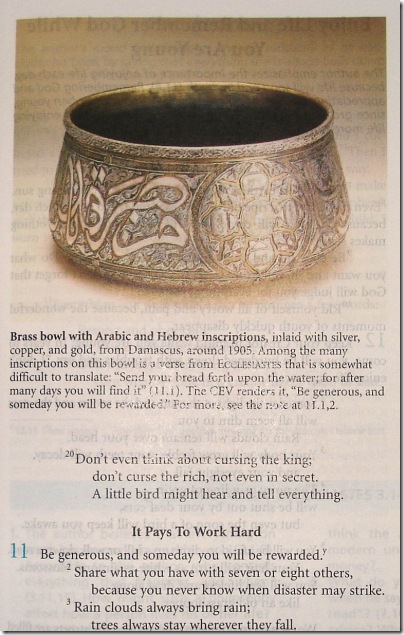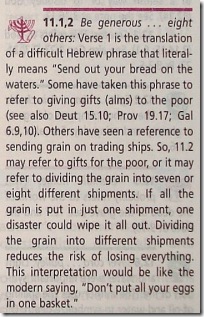Overly interpretive translations
Iyov has a post comparing different versions of Ecclesiastes 11:1. Here’s the KJV:
Cast thy bread upon the waters: for thou shalt find it after many days. Give a portion to seven, and also to eight; for thou knowest not what evil shall be upon the earth.
Looking at the different versions on Iyov’s post you can tell a lot about the philosophies of the different translation committees. Iyov is critical of interpretive translations that “close out alternative meanings.” When I first started consulting for a Bible translation I believed that you should find “the meaning” and translate it as clearly as possible. Now after almost ten years of battling to find the meaning I have relaxed quite a bit and now hope to eliminate misunderstanding without restricting a range of interpretations. That’s a linguistic tug-of-war that almost always ends with polysemy on the losing end of the rope.
Upon arrival in the US I found a copy of the CEV Learning Bible waiting for me. I almost said “weighing for me” because this volume is huge. Despite the hefty size and price tag (more than $30), I am really excited about this edition. It weds the clear CEV text to margins full of helpful notes. But my favorite part is all the pictures. The edition features artwork from all over the world and through the centuries. I’m definitely going to start using this for our family devotions.
Below are details from the page featuring Ecclesiastes 11:1.
Here is the note in the margin:
There’s a lot to like about this format. The text gives a clear “interpretation” of the original. Then the margin note muddies things up a bit showing how this phrase has been interpreted over the ages.
Head on over to read Iyov’s excellent article: Overly interpretive translations




5 Comments:
David, what do you think of this interpretation in CEV Learning Bible's side margin?
Do you think translators should ignore this interpretation and go with the literal interpretation?
Kevin, I don't see them making a choice in the marginal note but rather showing possible interpretations. Check out Iyov's post as well for other interpretations.
The CEV learning bible is on my short list of bibles to pick up. Though I am sort of tossing back and forth between that and CEV orthodox bible, since their translation of the apocrypha is, to the best of my knowledge, not available online. I'm taking it you are giving the learning bible an endorsement?
Interpreters text note btw mentions an Egyptian wisdom literature proverb, "Do a good deed and throw it in the water; when it dries you will find it".
Nice. Very, very nice. Let's have more use of notes like this, please.
I may have to pick that one up. Dang light wallet! ;)
Then the margin note muddies things up a bit showing how this phrase has been interpreted over the ages
Post a Comment
Subscribe to Post Comments [Atom]
<< Home